Fleurs du Mal Magazine


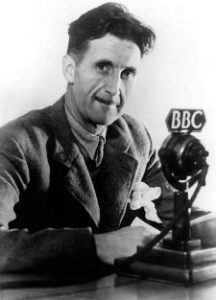
Poem from Burma
Brush your teeth up and down, brother,
Oh, brush them up and down!
All the folks in London Town
Brush their teeth right up and down,
Oh! How they shine!
Aren’t they bloody fine?
Night and morning, my brother,
Oh brush them up and down!”
George Orwell
(1903 – 1950)
Poem from Burma
• fleursdumal.nl magazine
More in: Archive O-P, Archive O-P, George Orwell, Orwell, George

My Land
A new land, like a stainless flower set
In the green foliage of the waving sea;
Or like a maiden whose fair heart is free,
Whose honest eyes with no sad tears are wet,
Whose bosom has no passion to forget,
But thrills and lifts exuberant, as she
Voices some sudden-flooding melody!
A land of strength, life, vigour, youth — and yet
An old land, grey as I, her child, am grey;
Filled with the whispers of old thoughts that stir
And wake, like shadows of the past that play
Deep in the beauty of a child’s grave eyes,
And show beneath life’s gladness glancing there
The pathos of a hundred histories.
Arthur Adams
(1872-1936)
My Land
• fleursdumal.nl magazine
More in: Adams, Arthur, Archive A-B, Archive A-B
‘Het is warm in de hivemind’ poëziedebuut van het jaar ♦ Maxime Garcia Diaz wint 35ste C. Buddingh’-prijs
Poetry International kende de C. Buddingh’-prijs 2022 toe aan Maxime Garcia Diaz voor haar poëziedebuut Het is warm in de hivemind, een uitgave van De Bezige Bij. De dichter kreeg de prijs voor het beste Nederlandstalige poëziedebuut van het jaar uitgereikt door juryvoorzitter Jelle Van Riet, tijdens De Staat van de Poëzie, het slotprogramma van het 52ste Poetry International Festival Rotterdam. Dit jaar dongen 26 poëziedebuten mee, naast winnaar Maxime Garcia Diaz maakten ook Ferdy Karto, Nisrine Mbarki en Esohe Weyden kans op de prijs. De jury bestond naast literair journalist en columnist Jelle Van Riet uit schrijver en podcastmaker Daan Doesborgh en dichter, schrijver en beeldend kunstenaar Michael Tedja.
Uit het juryverslag
De jury prijst Het is warm in de hivemind als bundel die alleen nu geschreven had kunnen worden. Met taal als het internet zelf, bij vlagen psychedelisch, vol memes, emoji, reclames en zijpaden, heeft Maxime Garcia Diaz een spannende bundel afgeleverd. Ze treedt er ver buiten de gebaande paden van de poëzie mee, wat de poëziewereld ongetwijfeld zal opdelen in lovers en haters. “Krachtige passages geven de lezer houvast en zin om verder te scrollen, swipen en surfen.” Diaz dicht onder andere over de problematische verhouding die jonge meisjes en vrouwen van nu met hun lichaam hebben en over het gebrek aan contact. De gedichten bulken van de referenties aan de popcultuur, maar verwijzen ook naar dichters en schrijvers zoals Allen Ginsberg, Sylvia Plath en Virginia Woolf. De jury roemt het activistische karakter van Maxime Garcia Diaz: “Het is warm in de hivemind is een debuut dat de lezer eens flink door elkaar schudt.”
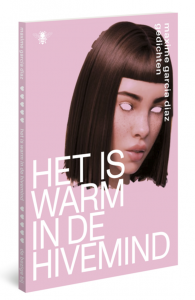
52nd Poetry International Festival
Met de Uitreiking van de C. Buddingh’-prijs 2022 sloot Poetry International vanmiddag de 52ste festivaleditie die afgelopen vrijdag begon feestelijk af. Eindelijk kon het weer, de kracht van het woord ervaren, in lijfelijke aanwezigheid van hongerig publiek en zoveel verschillende dichtersstemmen van over de hele wereld. Net als festivaldichter Marjolijn van Heemstra werden we “bijna emotioneel van de hoeveelheid publiek en de waanzinnige mix van stokken en stekjes die nieuwsgierig rondloopt, en vooral van het idee dat poëzie nog altijd gedragen wordt door een stevige groep wonderschone types die taal de tijd en ruimte geven die ze zo hard nodig heeft. Omdat we anders verstarren.”
Sinds 1988 bekroont Poetry International jaarlijks het beste Nederlandstalige poëziedebuut met de C. Buddingh’-prijs. Daarmee bevordert Poetry International de aandacht voor talentvolle nieuwe stemmen in de Nederlandstalige poëzie. Voor menig dichter van naam was de C. Buddingh’-prijs de eerste belangrijke trofee die in de wacht werd gesleept. Joke van Leeuwen, Ilja Leonard Pfeijffer en Anna Enquist, of recenter Lieke Marsman, Ellen Deckwitz, Marieke Lucas Rijneveld en Radna Fabias behoren tot de laureaten. De laatste editie werd in 2021 uitgereikt aan Wout Waanders, voor zijn bundel Parkplan (uitgeverij de Harmonie).
Het is warm in de hivemind
Maxime Garcia Diaz
Wat gebeurt er met een lichaam als het alleen maar naar een beeldscherm staart? Wat glinstert er tussen de ruïnes van de eenentwintigste eeuw? Dat onderzoekt Maxime Garcia Diaz in deze spetterende debuutbundel. Haar associatieve gedichten kronkelen, bedwelmen, ontregelen, en wortelen diep in het digitale, het feminiene en het hedendaagse. Flarden van nieuwsberichten vermengen zich met academische theorie en uitgestorven webpagina’s uit de jaren nul. In haar poëzie worden grenzen poreus – tussen lichamen, talen, stemmen – en is alles onzuiver.
Het is warm in de hivemind is een analoog internet, een papieren web, een bloederige rotzooi van popcultuur, ondode URL’s en meisjeslichamen. Een bruisend poëtisch debuut waarin de taal welig tiert, over fantasie, gekte, woede, angst, en een spookachtige revolutie. Deze meerstemmige maelstrom lijkt nog het meest op het internet zelf: grillig, gevaarlijk en vol van een duistere en vreugdevolle overvloed.
Maxime Garcia Diaz (1993) studeerde Cultural Analysis aan de Universiteit van Amsterdam. In 2019 won ze het NK Poetry Slam. Haar werk is eerder gepubliceerd door De Internet Gids, Samplekanon, Yes The Void, Deus Ex Machina en De Optimist. In 2020 kwam haar chapbook Artificielle uit bij het label Marktcorruptie en werkte ze met andere jonge schrijvers aan de voorstelling Poetic Resistance. Garcia Diaz is Nederlands en Uruguayaans en woont in Amsterdam. Haar poëziedebuut Het is warm in de hivemind verscheen in 2021.
Het is warm in de hivemind
Maxime Garcia Diaz
Type: Paperback
Uitgever: De Bezige Bij
ISBN: 9789403120614
NUR: 306
Aantal pagina’s: 112
Verschijningsdatum: 15-07-2021
Prijs 22,99
• fleursdumal.nl magazine
More in: #Editors Choice Archiv, - Book News, Archive C-D, Awards & Prizes, Garcia Diaz, Maxime, Poetry International
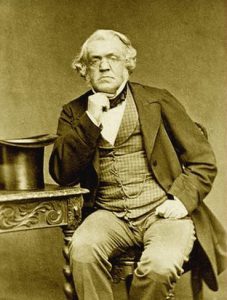
Sorrows of Werther
WERTHER had a love for Charlotte
Such as words could never utter;
Would you know how first he met her?
She was cutting bread and butter.
Charlotte was a married lady,
And a moral man was Werther,
And for all the wealth of Indies
Would do nothing for to hurt her.
So he sigh’d and pin’d and ogled,
And his passion boil’d and bubbled,
Till he blew his silly brains out,
And no more was by it troubled.
Charlotte, having seen his body
Borne before her on a shutter,
Like a well-conducted person,
Went on cutting bread and butter.
William Makepeace Thackeray
(1811–63)
Sorrows of Werther
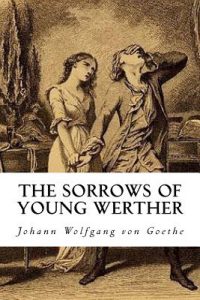
• fleursdumal.nl magazine
More in: # Classic Poetry Archive, -Die Leiden des jungen Werther, Archive S-T, Archive S-T

A Woman’s Game explores the history of women’s football from the Victorian era – with players in high-heeled boots – to the present day. It is the story of a rise, fall, and rise again: from the game’s first appearance in England in the late nineteenth century; through the incredible teams which at their height in 1920 drew 53,000 spectators to Goodison Park; to its 50-year ban in the UK and the aftershocks when that ban was lifted.
Now, as the women’s game is once again on an unstoppable upward trend, with internationally renowned players and a record 11.7m viewers for England’s semi-final match against the USA in the 2019 World Cup, Suzanne Wrack considers what the next chapter of this incredible story might be. From its relationship to the worldwide fight against oppression, to its ability to inspire change in the wider world, this is both a history of football as played by women, and a manifesto for a better game.
Suzanne Wrack is the women’s football correspondent for the Guardian and Observer. Her work has also been published in FourFourTwo, and she is a regular contributor to the Guardian’s Football Weekly podcast. In 2020, her investigation on abuse at the Afghanistan Football Federation won an AIPS Sport Media Award. A Woman’s Game is her first book.
A Woman’s Game
by Suzanne Wrack
The astonishing history of the rise, fall, and rise again of women’s football, from the late 19th century to the present day.
Format Paperback
Faber Publisher
ISBN 9781783352159
Date Published 16.06.2022
£14.99
• fleursdumal.nl magazine
More in: - Book News, - Bookstores, Archive W-X, NONFICTION: ESSAYS & STORIES
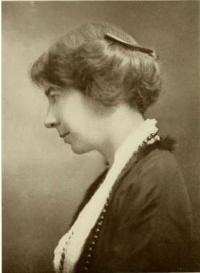
Day And Night
In Warsaw in Poland
Half the world away,
The one I love best of all
Thought of me to-day;
I know, for I went
Winged as a bird,
In the wide flowing wind
His own voice I heard;
His arms were round me
In a ferny place,
I looked in the pool
And there was his face
But now it is night
And the cold stars say:
“Warsaw in Poland
Is half the world away.”
Sara Teasdale
(1884-1933)
Day And Night
• fleursdumal.nl magazine
More in: Archive S-T, Archive S-T, Teasdale, Sara
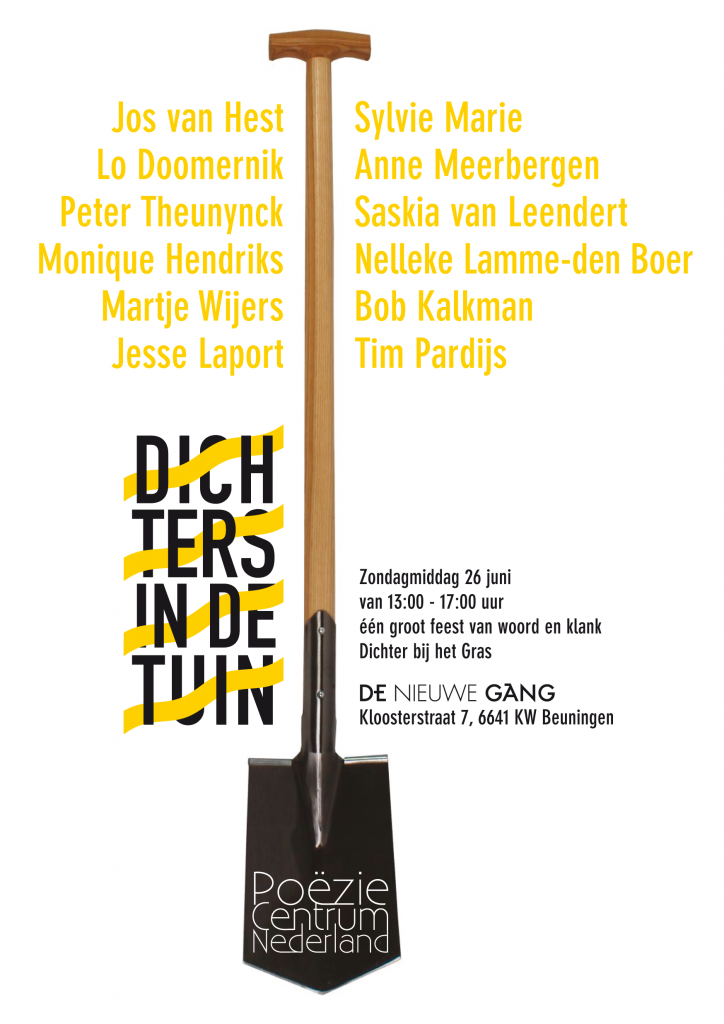
Datum zondag 26 juni, 2022 van 13:00 tot 17:00
Locatie De Nieuwe Gang, Kloosterstraat 7 in Beuningen
Twaalf dichters op vier podia
Dichters in de tuin is op zondag 26 juni van 13.00 tot 17.00 bij De Nieuwe Gang, Kloosterstraat 7 in Beuningen. Kaarten koop je via https://shop.ikbenaanwezig.nl/tickets/event/dichters-in-de-tuin-2022 voor €10,00 per persoon. De laatste kaarten worden aan de poort verkocht voor € 12,50.
Meer informatie over het programma, de dichters en de kaartverkoop: https://www.poeziecentrumnederland.nl/activiteiten/agenda/
Vanaf 2021 is het festival Dichters in de Tuin een samenwerking tussen De Nieuwe Gang en Poëziecentrum Nederland.
• fleursdumal.nl magazine
More in: #Editors Choice Archiv, #Modern Poetry Archive, - Book Lovers, Literary Events
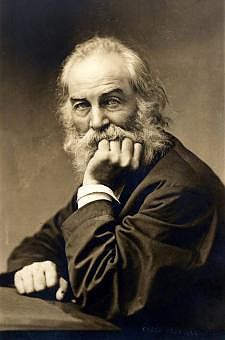
A noiseless patient spider
A noiseless patient spider,
I mark’d where on a little promontory it stood isolated,
Mark’d how to explore the vacant, vast surrounding,
It launched forth filament, filament, filament, out of itself.
Ever unreeling them, ever tirelessly speeding them.
And you O my soul where you stand,
Surrounded, detatched, in measureless oceans of space,
Ceaselessly musing, venturing, throwing, seeking the spheres to connect them.
Till the bridge you will need be form’d, till the ductile anchor hold,
Till the gossamer thread you fling catch somewhere, O my soul.
Walt Whitman
(1819 – 1892)
Poem: A noiseless patient spider
• fleursdumal.nl magazine
More in: Archive W-X, Archive W-X, Whitman, Walt

Come away, come away,
death
Come away, come away, death,
And in sad cypress let me be laid.
Fly away, fly away, breath;
I am slain by a fair cruel maid.
My shroud of white, stuck all with yew,
O, prepare it!
My part of death, no one so true
Did share it.
Not a flower, not a flower sweet,
On my black coffin let there be strown.
Not a friend, not a friend greet
My poor corpse, where my bones shall be thrown.
A thousand thousand sighs to save,
Lay me, O, where
Sad true lover never find my grave,
To weep there!
William Shakespeare
(1564 – 1616)
Song: “Come away, come away, death”
(from Twelfth Night)
• fleursdumal.nl magazine
More in: Archive S-T, Archive S-T, Shakespeare, William

Summer-Like
Summer-like for an instant the autumn sun bursts out,
And the light through the turning elms is green and clear;
It slants down the path and ragged marigolds glow
Fiery again, last flames of the dying year.
A blue-tit darts with a flash of wings, to feed
Where the coconut hangs on the pear tree over the well;
He digs at the meat like a tiny pickaxe tapping
With his needle-sharp beak as he clings to the swinging shell.
Then he runs up the trunk, sure-footed and sleek like a mouse,
And perches to sun himself; all his body and brain
Exult in the sudden sunlight, gladly believing
That the cold is over and summer is here again.
But I see the umber clouds that drive for the sun,
And a sorrow no argument ever can make away
Goes through my heart as I think of the nearing winter,
And the transient light that gleams like the ghost of May;
And the bird unaware, blessing the summer eternal,
Joyfully labouring, proud in his strength, gay-plumed,
Unaware of the hawk and the snow and the frost-bound nights,
And of his death foredoomed.
George Orwell
(1903 – 1950)
Summer-Like
• fleursdumal.nl magazine
More in: 4SEASONS#Summer, Archive O-P, Archive O-P, George Orwell, Orwell, George

Les fleurs rares
Entreprenant un long voyage
Ptit Lou hanté par l’histoire de Jussieu
Au lieu d’un petit cèdre prit… Quoi donc ?… Je gage
Qu’on de devinera pas ce que Dieu
Fit prendre à mon ptit Lou :… une fleur rare…
Dont elle ferait don aux serres de Paris…
La fleur étant sans prix
Et Dame Lou voyant qu’elle en valait la peine
Froissa pour la cueillir sa jupe de futaine.
Mais en passant dans la forêt
Allant prendre son train à la ville prochaine
Ptit Lou vit sous un chêne
Une autre fleur : « plus belle encore elle paraît !»
La première fleur tombe
Et la forêt devient sa tombe
Tandis que mon ptit Lou d’un air rêveur
A cueilli la seconde fleur
Et l’entoure de sa sollicitude
Arrivant à la station
Après une montée un peu rude
Pour s’y reposer de sa lassitude.
Avec satisfaction
Ptiti Lou s’assied dans le jardin du chef de gare.
« Tiens ! dit-elle, une fleur ! Elle est encor plus rare !»
Et sans précaution
Ma bergère
Abandonna la timide fleur bocagère
Et cueillit la troisième fleur…
Cheu ! Cheu ! Pheu ! Pheu ! Cheu ! Cheu ! Pheu ! Pheu ! Le train arrive
Et puis repart pour regagner l’Intérieur
Mais dans le train la fleur se fane et Lou pensive
S’en va chez la fleuriste en arrivant :
« Ces rares fleurs… j’en vais rêvant
Elles sont si rares, Madame
Que je n’en tiens plus, sur mon âme !»
La fleuriste s’exprime ainsi
Et Lou dut se contenter d’un souci
Que lui refuse
Sans lui donner d’excuse
Le directeur (un personnage réussi)
Des serres de la ville
de Paris
malgré tous les pleurs et les cris
De Lou qui dut jeter cette fleur inutile.
Et Lou du
Vilain personnage
Quittant le bureau, dut
Entreprendre à rebours l’horticole voyage.
Je crois qu’il est sage
De nous arrêter
À la morale suivante… sans insister !
Des Lous et des fleurs il ne faut discuter
Et je n’en dis pas davantage
Guillaume Apollinaire
(1880 – 1918)
Les fleurs rares
Poèmes à Lou
1915
• fleursdumal.nl magazine
More in: *Concrete + Visual Poetry A-E, Apollinaire, Guillaume, Archive A-B, Archive A-B, Guillaume Apollinaire
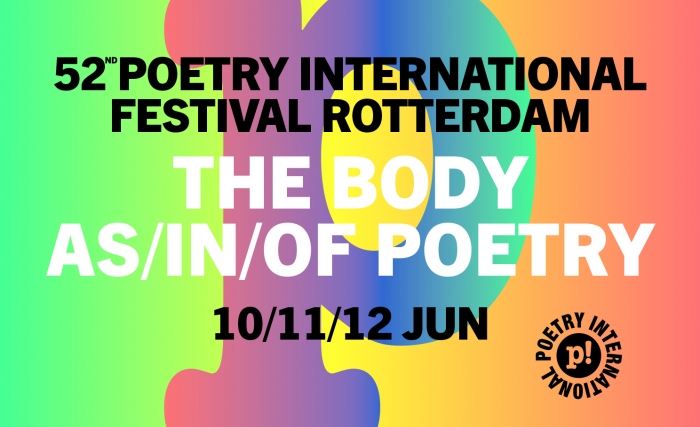
52nd Poetry International Festival Rotterdam
From Friday 10 to Sunday 12 June 2022
• fleursdumal.nl magazine
More in: # Music Archive, # Punk poetry, #Modern Poetry Archive, - Audiobooks, - Book Lovers, AUDIO, CINEMA, RADIO & TV, Awards & Prizes, CONCRETE , VISUAL & SOUND POETRY, LIGHT VERSE, MUSEUM OF LOST CONCEPTS - invisible poetry, conceptual writing, spurensicherung, Poetry International, TRANSLATION ARCHIVE
Thank you for reading Fleurs du Mal - magazine for art & literature